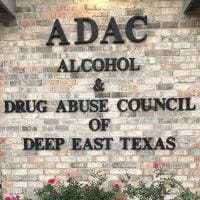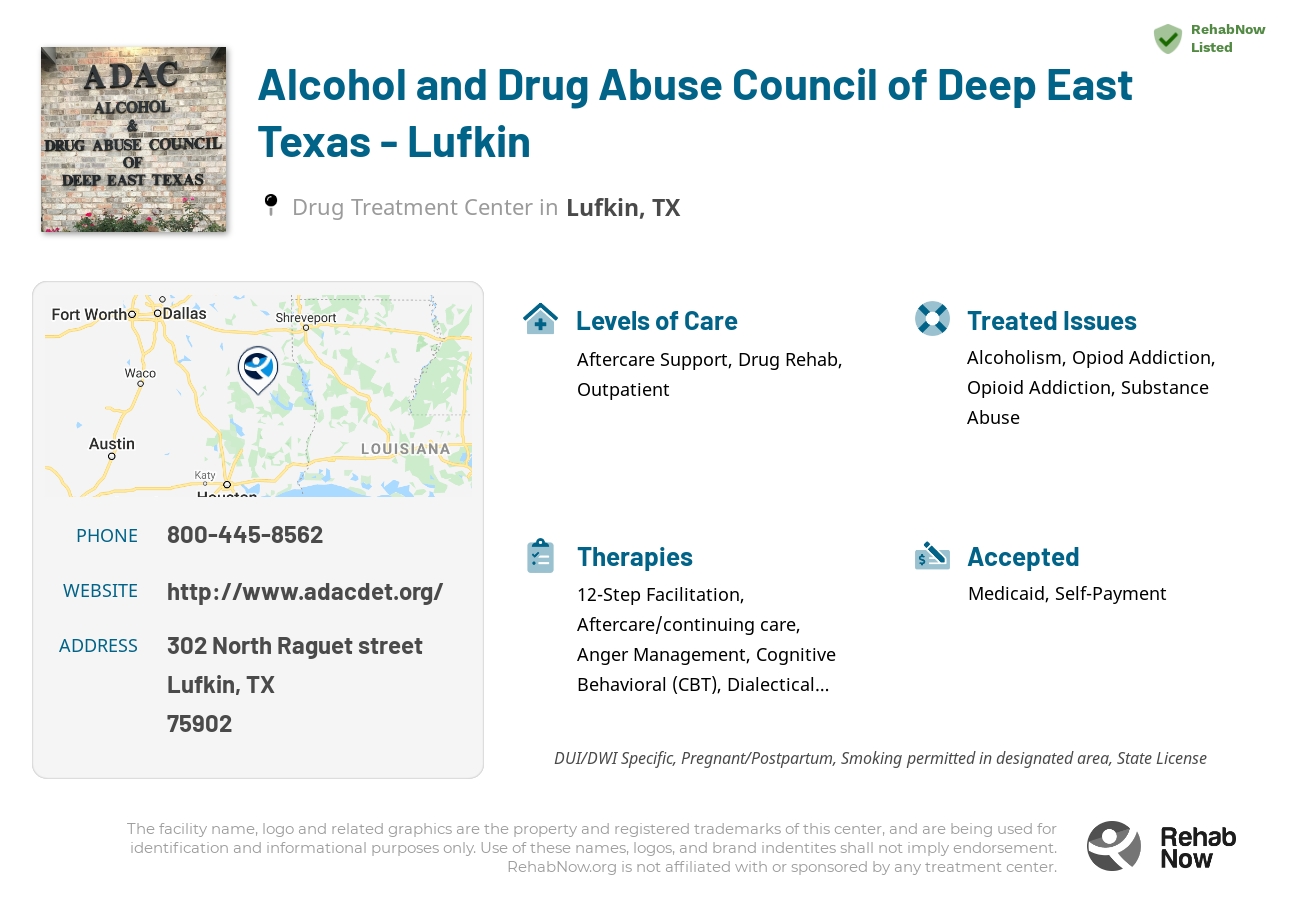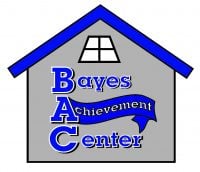Alcohol and Drug Abuse Council of Deep East Texas
Drug Rehab Center in Lufkin, Texas
The Alcohol and Drug Abuse Council of Deep East Texas (ADACDET) is a state-licensed facility in Lufkin, TX that provides comprehensive support and a personalized approach to those struggling with substance abuse and addiction, specializing in treating alcoholism and opioid addiction.
About Alcohol and Drug Abuse Council of Deep East Texas in Texas
Alcohol and Drug Abuse Council of Deep East Texas shines as a beacon of hope for individuals grappling with addiction in Lufkin, Texas. Focused on outpatient programs, this facility stands out for its dedication to providing professional and compassionate services tailored to meet individual needs through both individual and group therapy.
- Personalized Payment Plans: Implements a thorough "Financial Eligibility" process to ensure treatment costs are manageable for each client.
- Comprehensive Outpatient Care: Offers a combination of 1 to 2 individual sessions per month and weekly education and group therapy, accommodating clients for 3 to 6 months depending on progress.
- Youth Services: Aside from adult treatment, specialized outpatient services are available for younger individuals, incorporating family education.
Accredited with a state license, the Alcohol and Drug Abuse Council of Deep East Texas pledges a high standard of care across all services. Its team of seasoned professionals assesses and adjusts the treatment intensity and duration based on regular progress reviews, ensuring a tailored approach to recovery.
Focusing on alcohol, opioid, and other substance addictions, the council employs a variety of treatment methods such as Dialectical Behavioral Therapy (DBT) and Eye Movement Desensitization and Reprocessing (EMDR). They offer levels of care that include outpatient treatment and drug rehab, underscoring their flexible and comprehensive approach to overcoming addiction.
Genders
Ages
Modality
Additional
Accreditations
State License
Conditions and Issues Treated
Substance abuse is a severe problem that affects many people in Lufkin, TX. It is characterized by the excessive and inappropriate use of drugs, including alcohol, medications, and illicit drugs. Substance abuse can lead to physical or psychological dependence and affect social life and relationships. Treatment options include medications, counseling sessions, behavioral therapy, and group therapy. If you are suffering from substance abuse, contact for the latest treatments available.
Opioid addiction is when someone becomes addicted to opioids. This can happen quickly due to any opioid use. Opioid withdrawal can be uncomfortable and lead the user to continue using even if they want to quit. It’s best to receive inpatient treatment for detoxification.
Even if a person doesn’t need inpatient treatment, it’s recommended to start rehabilitation or at least some kind of outpatient treatment. This is because the withdrawal symptoms from opioids can be uncomfortable and unpleasant, to the point that a person could end up using again or worse.
Detoxification should be done to break the physical addiction of opioids. This can be done with opioid replacement therapy, medication-assisted therapy, or a more traditional detoxification program. Intensive outpatient treatment is a form of addiction care that allows patients to continue living at home while undergoing treatment. This type of care is appropriate for patients who have been treated in residential treatment programs. Intensive outpatient programs include regular visits to the facility providing therapy, and patients gradually return to their routine life. IOP benefits most when patients have a supportive family member or friend to help them recover.
The first step to getting into an intensive outpatient program is to attend a detoxification facility. Detoxification facilities are designed to remove substances from the body safely. The patient will attend sessions designed to help them understand their addiction and its impact on their lives. While in an intensive outpatient program, therapy sessions are scheduled three to five times per week, with the patient attending no more than two sessions in one day.
Levels of Care Offered
This center offers a variety of custom treatment tailored to individual recovery. Currently available are Outpatient, with additional therapies available as listed below.
Outpatient treatment consists of counseling and therapy sessions. The outpatient treatment process begins with the addict’s initial detox period, lasting about ten days. Outpatient treatment is used for those who are at moderate risk for “slipping back” into the addiction. It is also used for those who are not currently experiencing any side effects from withdrawal, can handle social pressure, have a stable living environment, and have a good support system.
Therapies & Programs
Individual Therapy is a crucial component of addiction recovery. Therapists work with patients to identify the root of their addiction and figure out how to better handle the issues that led to them using drugs. Individual Therapy is one on one sessions where people meet with their therapist. Individual therapy provides a safe space for people to open up and discuss personal and sensitive topics which they may not feel comfortable discussing in a group setting.
In this type of therapy, therapists can develop specific solutions for each patient, which helps speed up their recovery process. In addiction recovery, therapy is a crucial part. It allows patients to go deep into their core issues and discover how those problems can be better handled now. Therapy can be performed in individual sessions as well as group settings. In individual therapy for addiction, the patient meets with the therapist one-on-one to focus on the underlying issues of addiction and come up with solutions to prevent future abuse.
Family therapy is a crucial part of drug treatment and getting sober. It is one of the most effective ways to help addicts stay on the path to long-term sobriety. One of the most important parts of family therapy is the relapse prevention plan. During treatment, therapists and doctors will often sit down with the addict and their family to develop a plan if the addict ever feels like they want to use again. This plan should involve steps the addict and family can take together to prevent them from relapsing in the future.
An addict’s family can play a vital part in helping them to avoid relapse because they can spot the warning signs and help them get back on track before it becomes too much of a problem. Family therapy is one of the most effective ways to help addicts stay on the path to long-term sobriety.
Group Therapy is employed by drug treatment centers like Alcohol and Drug Abuse Council of Deep East Texas to provide the recovering addict with a platform to talk about their feelings and experiences. It also provides for an opportunity to learn from other addicts who have successfully overcome their addiction. It is recommended that all group members be recovering addicts for this type of therapy to work.
Dialectical behavior therapy (DBT) is a type of cognitive behavioral therapy that is focused on helping those with problematic behaviors caused by intense emotions and thoughts control and regulate their emotions and behavior.
Dialectic Behavior Therapy is beneficial for:
- People who have chronic suicidal thoughts and behaviors
- People who have chronic drug cravings
- People who have difficulty establishing and maintaining personal relationships
- People who have a mental disorder such as Borderline Personality Disorder
- People who have experienced trauma in their life
Cognitive Behavioral Therapy (CBT) is an approach and method in psychotherapy. Alcohol and Drug Abuse Council of Deep East Texas asks people to investigate how their thoughts, including habitual, harmful, and inaccurate ways of thinking, affect behaviors. CBT is based on the idea that rigid, inflexible ways of thinking cause people to have a limited ability to cope with stress, which leads to emotional distress.
Likewise, CBT helps people identify maladaptive behaviors and replace them with more positive behaviors. It makes you look at the way you perceive something and ask: Is this a realistic belief? CBT asks people to look at the role of behaviors and emotional responses and how they may be distressing in one’s life. The goal of CBT is to change the way people think and behave to achieve a more balanced, healthier lifestyle.
Moreover, CBT has been shown to reduce some types of anxiety disorders, depression, and symptoms related to thoughts or actions that are considered harmful.
EMDR helps patients deal with past events. The Alcohol and Drug Abuse Council of Deep East Texas This method also boosts healing which calms many allowing one to feel more in control when fighting addiction. EMDR is a therapeutic method that uses hand tapping or moving visual stimuli to provide stimulus to people recounting traumatic events.
Payment Options Accepted
For specific insurance or payment methods please contact us.
Alcohol and Drug Abuse Council of Deep East Texas Associated Centers
Discover treatment facilities under the same provider.
- ADAC in Jasper, TX
- Alcohol and Drug Abuse Council of Deep East Texas in Livingston, TX
- Alcohol and Drug Abuse Council of Deep East Texas in Nacogdoches, TX
- Alcohol and Drug Abuse Council of Deep East Texas - Livingston in Livingston, TX
- Alcohol and Drug Abuse Council of Deep East Texas - Lufkin in Lufkin, TX
Learn More About Alcohol and Drug Abuse Council of Deep East Texas Centers
Additional Details
Specifics, location, and helpful extra information.
Lufkin, Texas 75902 Phone Number(800) 445-8562 Meta DetailsUpdated April 15, 2024
Staff Verified
What else do people call Alcohol and Drug Abuse Council of Deep East Texas?
People have occasionally also searched for “Alcohol and Drug Abuse Council of Deep East Texas in Texas”
Alcohol and Drug Abuse Council of Deep East Texas Patient Reviews
There are no reviews yet. Be the first one to write one.
Lufkin, Texas Addiction Information
Texas is one of the primary hubs for drug smuggling into the country. The border between Texas and Mexico is more than 1,000 miles long. More than 10 million residents use alcohol every year and more than 25% of those are minors. Alcohol and drug use has become so common in Texas that almost 15% of all deaths can be attributed to these substances.
In Lufkin, Texas, around 9.8% of residents struggle with drug addiction. Approximately 4% of pregnant women used some form of an illicit drug during their pregnancy in 2014. According to recent statistics, drug addiction and abuse are one of the leading causes of death in Lufkin, TX. There are many types of treatment available in Lufkin, Texas. Some of the most common include inpatient treatment, outpatient treatment, and 12-step programs.
Treatment in Nearby Cities
- Stephenville, TX (212.8 mi.)
- Wimberley, TX (220.6 mi.)
- Coleman, TX (278.5 mi.)
- Clarksville, TX (158.1 mi.)
- Scurry, TX (126.4 mi.)
Centers near Alcohol and Drug Abuse Council of Deep East Texas
The facility name, logo and brand are the property and registered trademarks of Alcohol and Drug Abuse Council of Deep East Texas, and are being used for identification and informational purposes only. Use of these names, logos and brands shall not imply endorsement. RehabNow.org is not affiliated with or sponsored by Alcohol and Drug Abuse Council of Deep East Texas.





